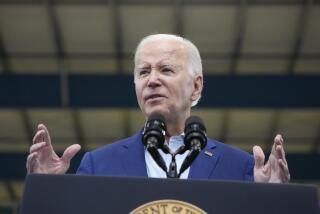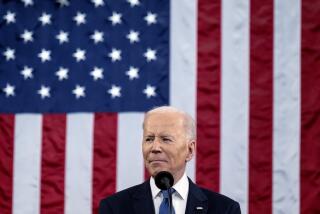Summit on Jobs Sought by Clinton : Economics: President addresses educators before flying to Tokyo. He wants finance and labor ministers to meet on unemployment.
- Share via
SAN FRANCISCO — President Clinton headed for the Tokyo summit of the world’s major industrial nations Monday calling for a joint effort to increase economic growth--and for yet another summit meeting.
The world faces a “troubling” new economic era, Clinton said in a speech to the National Education Assn. convention in San Francisco, an era marked by “stubbornly high rates of unemployment even in times of economic growth” not only in the United States but in Europe and Japan as well.
In the United States, unemployment has been stuck at or near 7% for a year, while in the European Community, figures released Monday put the unemployment rate at 10.5% in May--the 17th successive monthly increase.
So far, Clinton conceded, governments have failed to find remedies to the persistently high jobless rates. “We need to ask new questions, and we need to find new answers,” he said.
Ostensibly, finding answers to those questions is supposed to be Clinton’s focus at this week’s Tokyo meeting. But the President made clear that he expects the results of the meeting to be limited in that regard and issued an invitation to a follow-up meeting later this year that would bring together finance and labor ministers from the Group of Seven industrialized nations “to search for the causes and possible remedies for this structural unemployment.”
Clinton, a senior Administration official said after the speech, believes that “there are three dimensions” to the economic problems facing the industrial nations--the traditional questions of macroeconomics and world trade as well as “the third dimension of microeconomic policies” that affect labor markets.
But officials conceded that coordination of policies in that third area could be extremely difficult. The G-7 nations have spent nearly 20 years on an only partially successful effort to coordinate basic macroeconomic policies involving interest rates and currency values. Coordinating microeconomic policies on labor markets would be far more complicated, given that such efforts involve highly contentious domestic policy issues such as health care, welfare, labor laws and education.
“The first step is to get everyone focused,” the senior official said. “The President feels they can benefit by discussing these issues together.”
Clinton’s speech was the first of a series he plans to deliver over the next several days aimed at laying out his policies on the international economy and Asian security issues.
But a chief emphasis has also been to convince Americans that a foreign summit is important to the domestic economy.
In that regard, Clinton’s aides have made much of his attempt to focus the G-7 nations on the underlying structural causes of unemployment. They have pointed out that his stress on the issue marks a notable difference from the George Bush Administration’s emphasis on free trade or the Ronald Reagan Administration’s concentration on urging international reductions in the size of government and rates of taxes.
But while that message was meant to be the centerpiece of Clinton’s speech, it had to share billing with at least two other themes. Indeed, the speech strongly illustrated Clinton’s continued resistance to focusing on a single topic, sounding more like three speeches stitched together than a single effort.
In addition to his discussion of the summit, Clinton delivered a lengthy defense of his budget package, urging the assembled delegates to convey his message to their local communities “with enthusiasm and joy.”
Not surprisingly, Clinton received a warm welcome from the delegates, many of whom had worked for his campaign last year. He was preceded at the convention by an NEA-prepared video that reprised the 2.1-million-member union’s endorsement of candidate Clinton last year and lavishly praised him for “working with the NEA for change.” Clinton, the narration on the video said, had achieved remarkable results in a short period of time, “despite what the critics say.”
Now, “in his time of need, Bill Clinton needs his friends to stand by him,” the narration continued. “We finally have a President who shares our vision of the country. . . . This is our chance, this is our time; let’s stand together.”
Clinton picked up that theme, comparing himself to a teacher who has to present his class with a difficult lesson it does not want to hear.
“For 12 years, voters have been spoon-fed pabulum. They’ve been told that there’s a free ride.” There is, Clinton said, “a natural resistance” to accepting the need for difficult decisions such as military base closings, tax increases and program cuts, but “Americans will change if somebody will tell the people the truth.”
As part of his defense--and somewhat in contrast to his stress on unemployment--Clinton also spent considerable time in his speech stressing good news about the U.S. economy.
New Clinton counselor David Gergen has been emphasizing the need to do that, arguing that dwelling on the economy’s problems has harmed Clinton politically.
The nation is in the midst of a new, competitive global economy, Clinton said, and “we are better positioned for this new economy than most people think.”
U.S. productivity is once again improving, he argued, the government has begun to reduce its deficit, and almost 1 million jobs have been added to the economy since January. “It is not enough. It is nowhere near where we should be,” he said, “but it is a beginning.”
“I know life is tough for many Americans,” Clinton said, adding that the greatest problem the nation faces is “uncertainty” about the future. But he said that “there is no nation with more resilience” than the United States. “It is time once again to show what we are made of.”
The third part of the speech, not surprising considering Clinton’s audience, involved education. The President stressed his Administration’s education reform proposals and told the convention that improving education is crucial to the future of the U.S. economy.
Clinton told the delegates they could “rest assured” that he would fight for passage of his education reform package. But he also issued a carefully coded warning to the NEA’s leadership, saying he would fight any effort to water down the bill or remove its flexibility for state and local officials.
“We cannot run the schools of this country from Washington, D.C.,” he said. Some union officials and liberal Democrats in the House of Representatives have pushed amendments to the education bill that would greatly increase the federal role in education at the expense of the states.
The proposals would also reduce pressure on schools to increase standards for students unless states increase spending on public schools--a major goal of the union.
* BID TO END DEADLOCK: U.S. and Japanese negotiators hold intensive trade talks. A9
More to Read
Sign up for Essential California
The most important California stories and recommendations in your inbox every morning.
You may occasionally receive promotional content from the Los Angeles Times.











